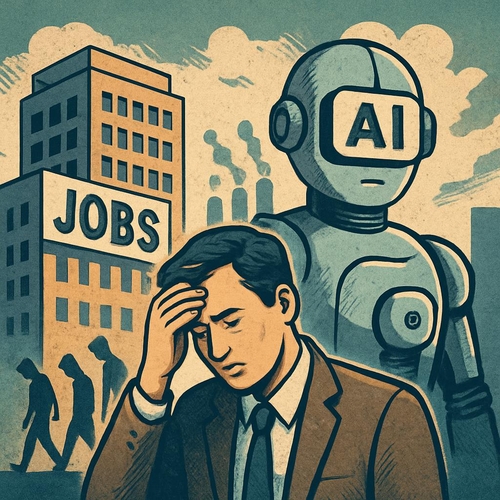(Seoul=Yonhap Infomax) The term "jobless growth" gained traction in the United States in the mid-2000s, describing a period when corporate profits and economic output expanded, yet employment failed to keep pace. The main drivers at that time were globalization and the IT revolution. As globalization accelerated, China became the world's factory, and U.S. companies began relocating manufacturing operations offshore, particularly to China. This offshoring trend led to a contraction in domestic manufacturing jobs. Meanwhile, advances in IT technology streamlined business processes, resulting in the disappearance of many repetitive clerical positions.
Now, more than 20 years later, the phrase "jobless growth" is resurfacing. This time, the catalyst is the artificial intelligence (AI) revolution, which is rapidly transforming the employment landscape. Initially, it was widely expected that blue-collar jobs would be most vulnerable to AI-driven automation. However, with the advent of generative AI such as ChatGPT, white-collar positions are increasingly at risk.
Major U.S. companies—including IBM (NYSE: IBM), Amazon.com (NASDAQ: AMZN), Meta (NASDAQ: META), Salesforce (NYSE: CRM), and Chegg (NYSE: CHGG)—have recently announced plans to cut thousands to tens of thousands of jobs. The common rationale behind these layoffs is the drive to maximize productivity and efficiency through AI adoption.
Marc Benioff, CEO of Salesforce, a leading CRM company, stated that the company has significantly reduced its customer support workforce, with AI now handling up to 50% of the company's workload. Chegg, an education technology firm, laid off 45% of its staff after a sharp decline in revenue attributed to the rise of AI. This represents an extreme case of AI fundamentally disrupting an industry's business model. While Amazon has publicly attributed its mass layoffs to organizational restructuring rather than AI, market observers remain skeptical of this explanation.
International media have noted that since the introduction of ChatGPT, freelance graphic designers and copywriters have seen both workloads and compensation decline. These professions are among those already experiencing tangible job displacement due to AI.
AI is not only increasing layoffs but also curbing new hiring, exacerbating youth unemployment. In the U.S. tech sector, hiring of young workers has notably slowed, impacting various aspects of the economy. According to the Stanford Digital Economy Lab, employment among young software developers dropped nearly 20% from late 2022. Research from Harvard and King's College London also found that companies adopting AI—especially in the tech sector—have reduced junior-level hiring.
Restaurant chain Chipotle reported in its earnings release on the 29th of last month that financial difficulties among people aged 25 to 35 have led to a decline in restaurant sales.
The precarious financial situation of young people is further highlighted by student loan repayment data. According to a report from the Federal Reserve Bank of New York, the student loan delinquency rate surged from 1% to 7.74% after the end of the payment pause in September last year.
Goldman Sachs noted in a report last month that the U.S. labor market is entering a new phase due to "jobless growth." The combination of AI proliferation, an aging population, and low immigration is creating a "new normal" for the U.S. economy, where productivity rises but employment stagnates.
Federal Reserve Chair Jerome Powell also expressed concern in September, describing the situation as "low-hire, low-fire," and warning that it is becoming increasingly difficult for college graduates, young people, and minorities to find jobs amid jobless growth.
While the impact has been muted so far, South Korea is also expected to face labor market shocks as AI adoption accelerates in industry. The trends unfolding in the U.S. are likely to materialize in Korea as well. Even as the economy recovers, job creation may remain subdued for an extended period. Young people may continue to struggle to find employment, while middle-aged workers face an uncertain labor market and intensifying competition with AI. (Senior Reporter, International Economics Department)
*

jang73@yna.co.kr
(End)
© Yonhap Infomax. All rights reserved. Unauthorized reproduction or redistribution, and AI training or utilization, are strictly prohibited.
Copyright © Yonhap Infomax Unauthorized reproduction and redistribution prohibited.

